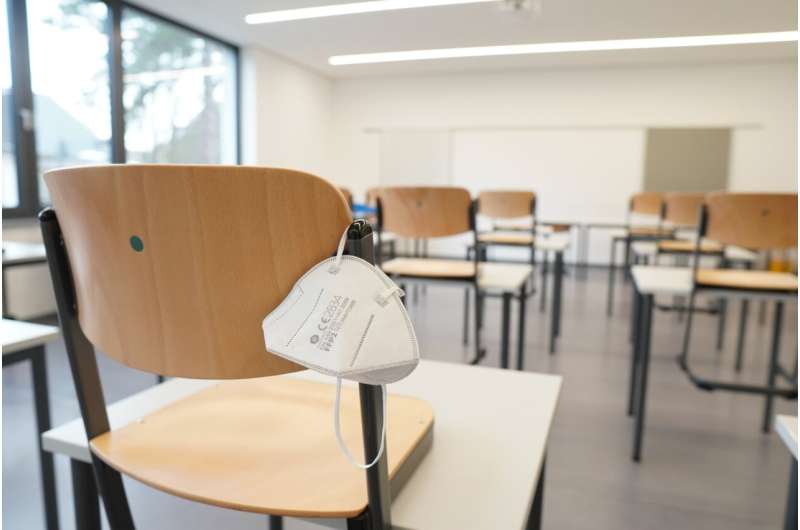This article has been reviewed according to Science X's editorial process and policies. Editors have highlighted the following attributes while ensuring the content's credibility:
fact-checked
peer-reviewed publication
trusted source
proofread
New study shows masks and air cleaners were associated with stopping COVID-19 in two Swiss schools

A new study shows that masking and portable air cleaners reduced the spread of the virus that causes COVID-19 in two Swiss schools. A team led by Nicolas Banholzer and Kathrin Zürcher of the University of Bern, Switzerland, publish these findings on May 18 in the open access journal PLOS Medicine.
During the early part of the COVID-19 pandemic, public health authorities worldwide closed schools to prevent the virus' spread. This decision sparked intense debate over the role of school children in transmission—a risk that is still poorly understood.
In the new study, researchers used molecular, environmental and epidemiological data to understand how the virus that causes COVID-19 spread in two secondary schools in Switzerland, from January to March 2022 during the omicron wave. The study included 90 students and looked at viral transmission in classes with and without masking or air cleaners.
The researchers consistently detected salivary and airborne SARS-CoV-2, the virus that causes COVID-19, in air samples and samples from students throughout the study period. However, concentrations of airborne SARS-CoV-2 were, on average, 70% lower with mask mandates and 40% lower with air cleaners. The findings suggest that between two and 19 infections could be avoided while masks were mandated.
The levels of airborne virus detected within the schools indicated that SARS-CoV-2 was continually transmitting among students, and that mask mandates were highly effective at reducing airborne concentrations, thus potentially preventing transmission. The researchers conclude that this monitoring approach could be used during future epidemics of respiratory viral infections to help understand transmission patterns, and whether suggested infection control measures are effective in reducing transmission.
Co-author Lukas Fenner adds, "Although our study has several limitations, including the observational nature of our study and that detecting SARS-CoV-2 in the air or aerosols does not necessarily mean transmission, we found that mask mandates reduced transmission in classrooms, and both masks and air cleaners reduced aerosol concentrations."
More information: ARS-CoV-2 transmission with and without mask wearing or air cleaners in schools in Switzerland: A modeling study of epidemiological, environmental, and molecular data, PLOS Medicine (2023). DOI: 10.1371/journal.pmed.1004226





















